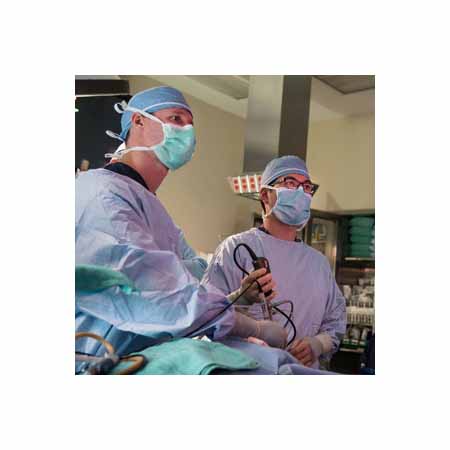UTHealth Houston’s Endoscopic Skull Base Program Shows Significant Growth
 Skull base tumors present with a broad range of symptoms that can make diagnosis challenging: nosebleeds, headaches, blurred or double vision, hearing loss, difficulty breathing, loss of balance, memory loss, or nausea and vomiting. Once diagnosed, they require an endoscopic approach to accelerate recovery and minimize trauma to the brain.
Skull base tumors present with a broad range of symptoms that can make diagnosis challenging: nosebleeds, headaches, blurred or double vision, hearing loss, difficulty breathing, loss of balance, memory loss, or nausea and vomiting. Once diagnosed, they require an endoscopic approach to accelerate recovery and minimize trauma to the brain.
Texas Skull Base Physicians in the Department of Otorhinolaryngology and the Pituitary and Vision Change Program in the Vivian L. Smith Department of Neurosurgery bring together the diverse range of physicians needed to diagnose and evaluate each case accurately, incorporating otorhinolaryngology, neurosurgery, endocrinology, neuro-ophthalmology, diagnostic radiology, interventional neuroradiology, radiation oncology, and pathology for a comprehensive diagnosis and treatment plan. For patients who require endoscopic surgery, an otorhinolaryngologist and neurosurgeon work together on the case, operating in tandem using a transsphenoidal endoscopic approach that helps improve patient outcomes and minimize recovery time.
Rhinologist William Yao, MD, associate professor in the Department of Otorhinolaryngology-Head and Neck Surgery and director of the otorhinolaryngology residency program, and Spiros Blackburn, MD, associate professor in the Vivian L. Smith Department of Neurosurgery and director of the neurosurgery residency program, have worked together successfully on cases at McGovern Medical School since 2015. “We’re in sync,” Dr. Yao says. “We augment each other’s surgical skills and expertise. I create a favorable approach that gives Dr. Blackburn the access he needs to remove the tumor in its entirety. Because we operate together frequently, we know each other’s moves, like an orchestra with multiple instruments. While our knowledge sets overlap, they’re completely different. By working with him over the last seven years, I’ve learned about neuroanatomy from the neurosurgery perspective. Our partnership is such that if there is anything that concerns either of us about a patient, we can drop in and help each other out at any time.”
Thanks to that partnership, the program has grown from 10-15 cases annually in 2015 to approximately 100 cases annually in 2023. “Our excellent results in patients have transformed us into a major referral center,” Dr. Yao says. “Because skull base tumors can be challenging to diagnose, it’s not uncommon for us to see patients who have been at other hospitals for three or four days before a tumor is noted. Once we get a transfer, we deliver streamlined care to prevent progression of the tumor and loss of vision or other complications.”
Katie Guttenberg, MD, associate professor of internal medicine, joined the Division of Endocrinology, Diabetes, and Metabolism at McGovern Medical School in 2016 and works closely with Dr. Yao and Dr. Blackburn to diagnose endocrine conditions associated with skull base tumors and develop treatment and management plans for hormonal disorders. She sees patients with Dr. Blackburn in the newly designed Pituitary Center.
“Dr. Guttenberg is also a critical pillar in delivering care to our patients at the Pituitary Center,” Dr. Yao says. “She manages perioperative hormonal imbalances that occur as a result of the tumor or from postsurgical changes. We all work together closely in partnership.”
For more information, call 713-486-5000 or visit www.texasskullbase.org.